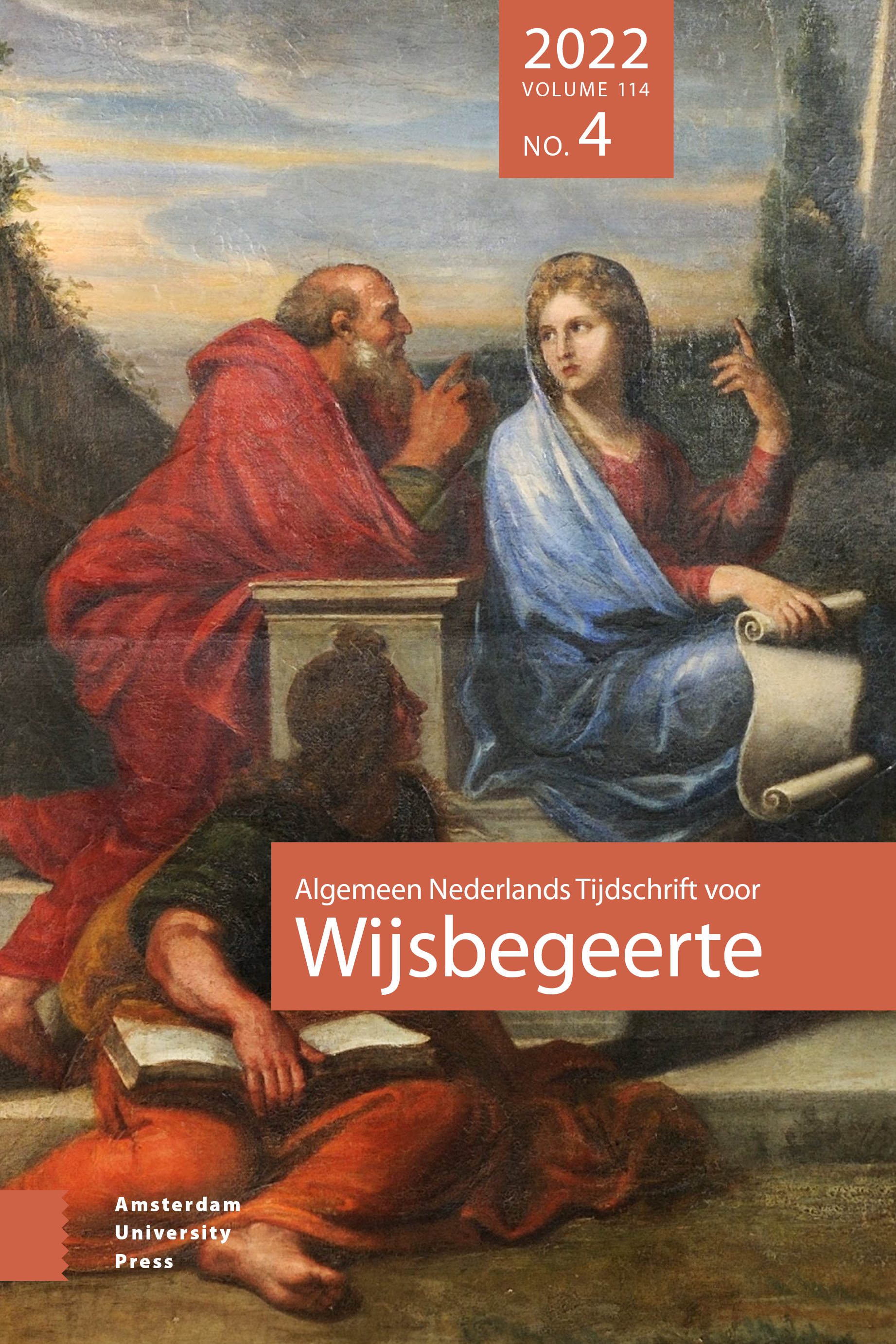- Home
- Publications
- Algemeen Nederlands Tijdschrift voor Wijsbegeerte
- Previous Issues
- Volume 114, Issue 4, 2022
Algemeen Nederlands Tijdschrift voor Wijsbegeerte - Volume 114, Issue 4, 2022
Volume 114, Issue 4, 2022
-
-
Vrouwen die denken zijn lastig
More LessAuthor: Aline D’HaeseAbstractWhere were the women? On exclusivity in ancient Greek democracy
This article examines the position of women in Athenian democracy. First, we briefly explain what democracy in Athens looked like during its heyday. It is then explained that women were excluded from the active life in the polis and that at the same time there was an ambivalence in the classical Greek view on the status of women. Furthermore the role of women in fictional stories is elucidated as a possible explanation for her exclusion from real, active community life. It also discusses some key critics of democracy, with a particular focus on their views on the role of women in the state. Finally, the ideas of three female philosophers from ancient Greece are explained and it is argued that they possibly became known not on their own merits, but only because the female philosophers were seen as eccentric.
-
-
-
Democratie, vrijheid van meningsuiting en wetenschap
More LessAuthor: Herman de RegtAbstractDemocracy, freedom of speech, and science
The On Liberty arguments of John Stuart Mill and Harriet Taylor are still strong arguments for an unrestricted freedom of speech. For them, freedom of speech is closely linked to the idea of truth-finding, and truth-finding is crucial for a democratic society like ours and the development of its participants. In short, without freedom of speech, the tyranny of the majority looms. However, it is also reasonable to restrict freedom of action if expressions cause pain to democratic citizens. Since the question whether expressions, including speech, cause pain requires a scientific study of psychological pain, the issue of democratic freedom of speech is intimately linked to, and even depends on scientific inquiry.
-
-
-
Hoe politiek mag onderwijs zijn?
More LessAuthors: Anouk Zuurmond & Piet van der PloegAbstractTo what extent can politics be part of education?
Recent incidents indicate how educational activities aimed at raising political awareness are perceived by some as forms of ‘indoctrination’. This article explores, firstly, how philosophical perspectives might help us understand the notion of indoctrination in education. Drawing on the work of Hannah Arendt and Michael Hand, two notions of ‘indoctrination’ are discussed and subsequently problematized in light of classroom practices. Expanding our perspective to the larger historical context of reflections on education and democracy, we then show how the dilemma of indoctrination should be understood as part of a tradition in pedagogical thinking that emphasizes the complex dynamics of socialization and critical thinking in education. Finally, we argue that from a pedagogical perspective, the issue is not whether or not certain educational activities might be forms of indoctrination, but to what extent these activities provide students an opportunity for both socialization and critical inquiry.
-
-
-
Ecce homo videns, of hoe iemand wordt wat hij aanschouwt
More LessAuthors: Bart Jansen & Lorenzo NieuwenburgAbstractEcce Homo Videns, or How a Person Becomes What He Beholds: Synchronicity between Bourdieu and Sartori on Television and Democracy
What role does television play in liberal democracy? This topical question is the focus of two essays, one by the French sociologist Pierre Bourdieu and another by the Italian political philosopher Giovanni Sartori. Bourdieu’s position, in short, is that the television medium manipulates information from which a structural corruption emerges. Sartori, in turn, argues that television modifies thought at best and impoverishes it at worst. In this contribution, the essays of both authors are taken as the starting point for a comparison. First the article discusses the ‘primacy of the image’, and it elucidates how both thinkers relate to the ubiquitous visual culture. It then examines ‘tele-directed opinion’ and offers a deeper insight into the ‘public opinion’, and in turn the ‘opinion poll’. Here their thinking on what is called media logic unfolds: the idea that media, instead of merely reporting the course of things, influence it. In the third part, the article explores the question of what Bourdieu’s and Sartori’s insights imply for politics and democracy. It discusses the electoral and political influence that television exerts in their view. The article concludes the discussion by asking to what extent Bourdieu’s and Sartori’s essays are still relevant and whether their commentary on television can be applied one-to-one to social media. Thus, the authors are compared not only textually, but also temporally (1990s and 1920s). Despite their differences, we have found that there are striking resemblances between television and social media, especially when it comes to the influence both media have on society and liberal democracy.
-
Most Read This Month

Most Cited Most Cited RSS feed
-
-
Philosophy and Wisdom
Author: Peter Jonkers
-
-
-
A praise of pain
Author: Giulia Sissa
-
- More Less

